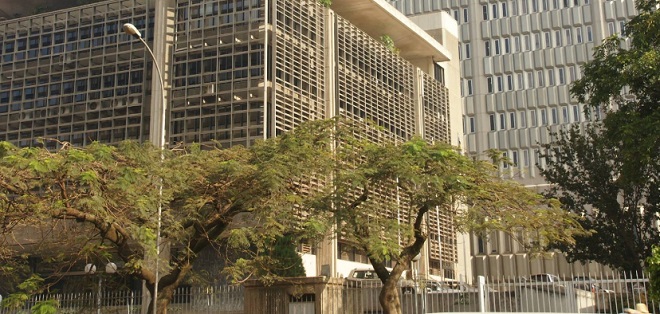
Kampala, Uganda | HAGGAI MATSIKO | On Aug.3, at exactly 8:45am, Central Bank Governor, Emmanuel Tumusiime Mutebile arrived at the Finance Ministry, where he had been summoned for a meeting at exactly 9:00am.
Finance Minister, Matia Kasaija, had asked him to come and explain why his team had criticized the mobile money tax on Aug.1 while appearing before parliament’s finance committee.
Bank of Uganda’s Dr. Charles Abuka, the Director, Statistics Department, had told the parliamentary committee that the tax on mobile money was “discriminative”, “unfair”, and a threat to growth of financial inclusion.
Aomu Mackay, the Director National Payments, Ivan Setimba, Deputy Director, National Payments in charge of financial inclusion, and Christine Namanya, the deputy director research escorted Abuka in parliament.
Abuka’s statements sparked outrage in some quarters at BoU, the Finance Ministry and State House. The comments appeared a major slap in the face of officials at Finance and President Museveni who have intensively labored to explain and get Ugandans to accept the tax.
As part of the budget, the Finance Ministry levied a one percent tax on the value of mobile money transactions but following intense public backlash, the president directed that it be whittled down to 0.5 percent. Telecom companies and mobile money dealers have been lobbying to have the tax scrapped or reduced again. Instead of making a case for government, Abuka appeared to bat for the other side.
Enraged, President Museveni called Mutebile expressing concerns about the statements, sources at State House told The Independent. The following day, Kasaija summoned Mutebile. Mutebile was also furious. He had already ordered Abuka to explain his statements at parliament. Later, the Governor’s office informed the officials that they had been summoned by Finance because of the remarks they had made.
While the governor arrived at Finance 15 minutes to 9:00 am, Abuka and his team arrived late—several minutes past 9:00 am, sources at the Finance Ministry told The Independent.
State Minister for Planning, David Bahati chaired the meeting, which took place in the Minister’s Boardroom.
At the meeting Bahati asked Mutebile to explain why the BoU team while in parliament had criticised the mobile money tax yet they (BoU) had been part of a string of meetings that had agreed that the tax was critical for government to fund the budget—the mobile money tax was expected to raise some Shs. 115 billion.
Mutebile responded that his office had communicated the BoU position to the team that appeared in parliament, however, he did not know where they got the position they presented. He said he had not cleared that position and that it was not the BoU position.
Then the Governor turned to Dr. Charles Abuka and asked him to explain where the position he presented had come from. Abuka also distanced himself from his own position, according to sources at the Finance Ministry, who are knowledgeable about what transpired.
Abuka said that the media had misquoted him. They only reported the bit where he was discussing elements that make a good tax and how the tax affected financial inclusion. The media, he said, just picked that.
However, Abuka later apologized. At one point, the Secretary to the Treasury, Keith Muhakanizi, who also attended the meeting, came to Abuka’s rescue.
He said that when some of these civil servants go to parliament, they get intimidated and end up saying what they are not supposed to say.
What Muhakanizi did not know is that when Abuka made the remarks in parliament, they kicked off an informal investigation with in the walls of BoU.
How could these officials present a position contrary to that of the Governor? Officials wondered. Phone calls were made. Then word started circulating that Abuka passed by the Deputy Governor’s office before he went to parliament. The conclusion was that the position changed between the Governor’s office and that of his deputy.
At the central bank, Abuka’s position was seen as part of the simmering institutional politics, which some say are aimed at undermining the authority of the Governor.
In the past, The Independent has reported about a power struggle between the Governor and his deputy. When The Independent revealed this in a series of articles early this year, the Governor dismissed the reports.
The two officials have even had lunch dates to try and bury the hatchet. But tensions have remained mostly amongst their proxies. The central bank is divided into two camps—those loyal to Kasekende and those loyal to Mutebile.
While Mutebile heads the bank, the way his roles and those of his deputy are structured give the latter immense powers.
Most importantly, as Deputy Governor, Kasekende is directly in charge Finance and Administration, by extension the day to running of the bank. This has given him a vantage point and influence over many senior officials at the bank.
As Governor, Mutebile mostly keeps tabs on Banking supervision and Research. He was nicknamed “policy” because he deals mainly with policy. Mutebile is also not known to be a micro-manager and as result had ceded many of the to day activities to senior management headed by Kasekende.
Indeed, the mobile money crisis emerged at the time Kasekende was dealing with other crises under his docket.
For over a week, the bank’s power system had been facing challenges. Almost on a daily basis, electricity was disappearing—affecting bank operations.
Several years ago, the bank spent hundreds of millions procuring two power lines, from different directions. The idea was to ensure that if one of the lines was off, the other one would be on to ensure that bank systems kept working.
However, it has been discovered that the two lines, in fact, were from the same source—the reason they have all been going off at the same time.
Even the bank’s Uninterruptible Power Source (UPS), which is supposed to provide emergency power in case of an outage, is faulty.
Initially, officials thought the power problems were usual problems. However, suspicions of sabotage emerged when they decided to use the generator.
Those in charge left the generator running. However, insiders say, at about 6:00 am in the morning, the generator was switched off too plunging the bank’s system into darkness. This was baffling.
Fuel was not the problem—the bank has a steady reserve. As a result, many felt that someone had intentionally switched it off.
With power off, critical bank operations are hindered. Systems that rely on the Internet cannot function. The bank has systems officials use to communicate with local and international banks. Without power and the Internet, these systems cannot work. Even the email system has been on and off.
To get to the bottom of the crisis, Kasekende chaired several fire-fighting meetings. The situation was too bad that in one of these meetings, he said;
“Me and you our jobs are on the line if this power problem is not resolved,” Kasekende said referring to Solomon Oketcho, the Executive Director for Administration.
 The Independent Uganda: You get the Truth we Pay the Price
The Independent Uganda: You get the Truth we Pay the Price


